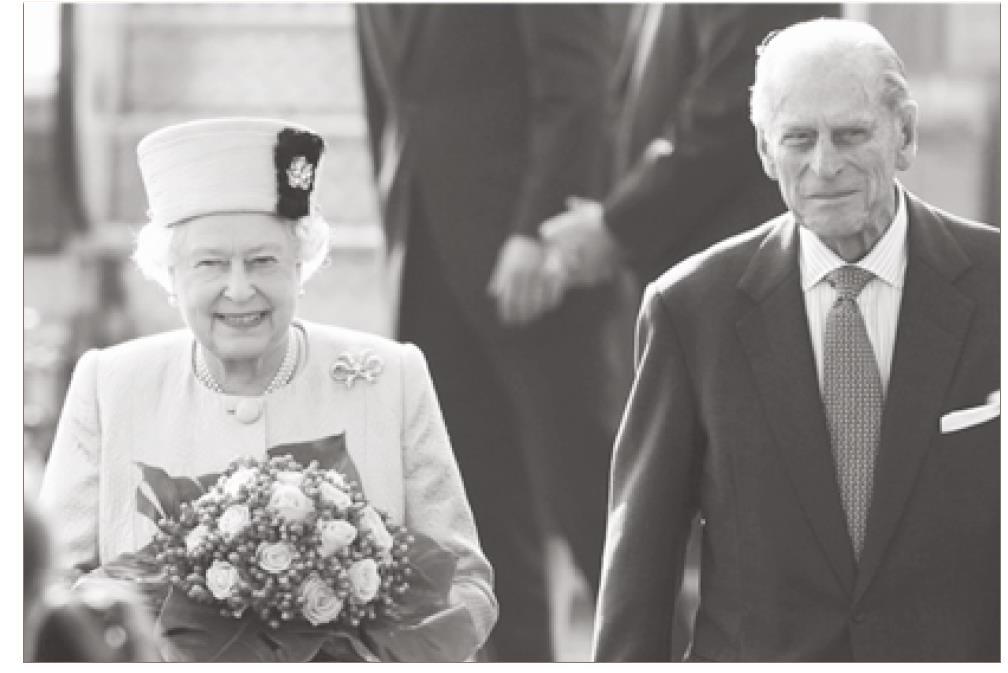英国人的上唇不再绷紧?
2016-05-14ByIanHislop
By Ian Hislop

The End of the Stiff Upper Lip?
Several years ago, there was a moment when I stood in the pouring rain watching the Royal Flotilla during the Diamond Jubilee when I thought I might be on to something.1
After five hours getting completely soaked, the people next to me were still happily pointing out the little boats that had been to Dunkirk or the motor boat that had taken part in the Normandy landings or leading a huge cheer for a barge containing an Indian band in kilts playing the bagpipes.2
The weather in Britain does tend to bring out a sort of mad, masochistic defiance in people.3 But on this occasion I thought that everyone, from the elderly Queen and the Duke of Edinburgh, who refused to sit down, to the massed choirs who belted out their anthems with dripping hair and running mascara, to the crowds with their umbrellas and thermos flasks of tea, was taking part in a grand pageant of stoicism.4
The fact that it resulted in the duke being hospitalised and various boat crews being treated for hypothermia5 only seemed to add to its appeal.
I enjoyed the whole thing greatly even though I was aware of the fact that it was slightly bonkers6. Over centuries, the British have come to be seen by others and to see themselves in terms of reserve, resilience and restraint.
But this has not always been the case. When the Dutch scholar Erasmus7 came to London at the turn of the 16th Century he wrote home in amazement, describing how the English spend the whole time kissing each other. “Wherever you move there is nothing but kisses,” he noted.
Italian visitors in the Elizabethan period remarked upon how emotional everyone was and how we lacked self control. And it was the French who had words like “sang-froid” and “insouciance” to describe qualities that the British did not yet appear to possess.
In the 18th Century the word “sentimental” was not pejorative8 in this country. It was a term of praise for a person of taste and refinement who displayed their emotions openly. The nation which would become known for its ability to “keep calm and carry on” had yet to appear.
The evolution of the stiff upper lip is unexpectedly complex—emerging out of the French revolution and the Napoleonic wars as a reaction to what Britains rulers felt was a dangerous unleashing of unrestrained passion on the continent.
Taking the lead from the prototypical Duke of Wellington,9 this model of stoic self-control was then rolled out from top to bottom of society. It then flourished in the imperial heyday with a parade of unflappable Victorian soldiers, explorers, and administrators who were supported by an equally tough cast of long-suffering women and doughty memsahibs.10
The story turns tragic in World War I as a whole uncomplaining generation seemed to walk straight into the enemy guns before struggling on for four hellish years.
In the aftermath of the carnage it seemed as though the stiff upper lip was finished for good.11 But it was consciously revived in the Great Depression as a unifying national identity and then reinvented with a smile in the legendary cheery spirit of The Blitz12.
After WWII came austerity13 but the arrival of prosperity in the 1950s, and then the rapid social change of the 1960s, left the stiff upper lip looking old-fashioned and even more so when the “me generation” embraced therapy and “letting it all hang out”.
The nadir came in the events surrounding the death of Diana when the entire nation seemed to decide that dated notions of reserve, decorum and restraint were to be abandoned in favour of emotional release.14
Colin Firths portrayal of King George conforms to the stereotype that Hollywood has of the British: emotionally cool and reticent, unruffled by the ordinary floods of emotions that roil lesser mortals.15
The problem is the cliche no longer matches reality. In Britains Age of Austerity, stiff upper lips are becoming flaccid16, suddenly everyone on this island is passionate. People are dripping and weeping with “passion”.
The writer and historian AN Wilson says “the greatest factors in the development of the stiff upper lip were English public schools and Scottish Presbyterianism17”. That more or less covers my education and background.
Having sat through Latin lessons studying Aeneas as a model of stoical leadership, and having a grandfather who was a member of Glasgow Boys Brigade, fought in Flanders, and was a stern lay-preacher, you could argue that I am no great expert on emotional literacy.18
But one can analyse the strengths and weaknesses of the stiff upper lip by examining sources as varied as the novel Robinson Crusoe and the Battle of Britain sketches in Beyond the Fringe.
Everything from Victorian newspaper parodies about over-emotional policemen to the reaction to the first sexually explicit British edition of Cosmopolitan magazine can provide evidence.19
So can the HG Wells film Things to Come about futuristic air raids, and the classic British Character cartoons of Pont between the wars.20
The story of the stiff upper lip is a remarkable one. It may not be over.
几年前女王登基60周年“钻石庆典”那天,我站在瓢泼大雨中观望皇室船队,有那么一瞬我似乎意识到了些什么。
在雨中待了五个小时几近湿透,我周遭的人们仍然要么在兴高采烈地指认曾驶经敦刻尔克的小船或是参与过诺曼底登陆战的摩托艇,要么向船上穿着苏格兰褶裥短裙演奏风笛的印度乐队大声欢呼。
英国的天气确实容易激发出人们某种疯狂、自虐般的反抗。然而在这一场合我想每个人,无论是即使年迈仍不愿坐下的女王和爱丁堡公爵,或是任凭头发湿透、眼妆晕开仍然卖力演唱圣歌的合唱团,还是打着雨伞、揣着装有茶水的暖水壶的群众,都在参与一场展示 “坚忍克己”的盛大演出。
结果公爵为此住院、不少船员因体温过低接受治疗,似乎让这场“演出”更富有感染力。
我很享受这一切,尽管我意识到整件事有点疯狂。几个世纪以来,英国人被视为且自视为“含蓄内敛、坚忍不拔、克己隐忍”的代名词。
但事实并非总是如此:荷兰学者伊拉斯谟16世纪初来到伦敦,他在寄回家乡的信中描述了英国人如何无时无刻不在互相亲吻,令他感到十分惊奇。“不论你身在何处,总有人在亲吻。”他写道。
伊丽莎白时期意大利来访者评论起英国人时会说我们都是性情中人且缺乏自制力。而当时是法国人才用“sang-froid”(意为“沉着冷静”)和“insouciance”(意为“无忧无虑”)之类的词来描述这些英国人当时看上去似乎尚不具备的品质。
18世纪时,“多愁善感”一词在本国并无贬损之意,而是用来赞美品位高尚优雅、公开展露情绪的雅士。那个以能够“保持冷静,继续前行”而著称的国家尚未出现。
“绷紧上唇”的进化历程令人出乎意料地复杂:法国大革命和拿破仑战争时期,欧洲大陆民众恣意宣泄情感,让英国当权者感到十分危险,“绷紧上唇”应运而生。
威灵顿公爵作为典范一马当先,坚忍克己的品质随后从上至下在全社会传开。在大英帝国鼎盛时期,这种品质遍地开花:维多利亚时期形形色色的士兵、探险家和官员大都沉着冷静,为他们排忧解难的是同样坚忍不拔却饱受煎熬的女性和不让须眉远赴印度的英国妇女。
一战时故事转向悲剧:整个毫无怨言的一代似乎就这么直挺挺地走向了敌人的枪口,在人间炼狱中抗争了四年。
那场屠杀后似乎“绷紧上唇”彻底完了,但却在大萧条期间作为团结一致的民族特性被有意复兴,在伦敦大轰炸期间则变成了微笑以展现那传奇般的乐观精神。
二战后经济紧缩,然而20世纪50年代繁荣的到来和60年代的社会剧变让“绷紧上唇”显得过时,在欣然接受心理治疗与“和盘托出”的“唯我独尊的一代”面前更是如此。
戴安娜王妃去世及其相关的一连串事件使“绷紧上唇”走向低谷:整个国家似乎都认为含蓄内敛、端庄有礼、克己隐忍已然过时,理应丢弃,让情感宣泄取而代之。
科林·费尔斯对英国乔治六世的演绎符合好莱坞对英国人的刻板印象:冷静淡漠、沉默寡言,在足以让其他凡人情感翻涌的境况面前仍然内心不起一丝波澜。
问题是这一过时的套话不再与现实相符。如今,在英国的经济紧缩时代,“绷紧上唇”正日益疲软,这座岛国上一时间人人都充满激情。人们沉浸在“激情”中洒汗淌泪。
作家、历史学家安德鲁·诺曼·威尔逊称“对‘绷紧上唇的发展影响最大的因素是英国公学和苏格兰长老会”。这或多或少包含了我所受的教育和成长背景。
我曾经在拉丁语课研究过埃涅阿斯这位坚忍不拔的领袖人物;我的祖父曾是格拉斯哥少年军的成员,在法兰德斯战役中打过仗,而且是位严厉的俗家传教士。那么你可以说我在坦露情感方面不善言辞。
但是人们可以通过检视如小说《鲁滨逊漂流记》和《超越边缘》中关于英国之战的概述等多处来源来分析“绷紧上唇”的优点和缺点。
无论是维多利亚时期报纸上针对过于情绪化的警察所撰写的戏仿文,还是人们对第一期过于色情的英国版《时尚Cosmopolitan》杂志的反应,都可以提供证据。
由赫伯特·乔治·威尔斯编剧的电影《笃定发生》中关于未来空袭的描绘,以及战时蓬特创作的经典漫画《英国人的性格》也都可以。
“绷紧上唇”的故事精彩非凡。这个故事或许并不会就此完结。
